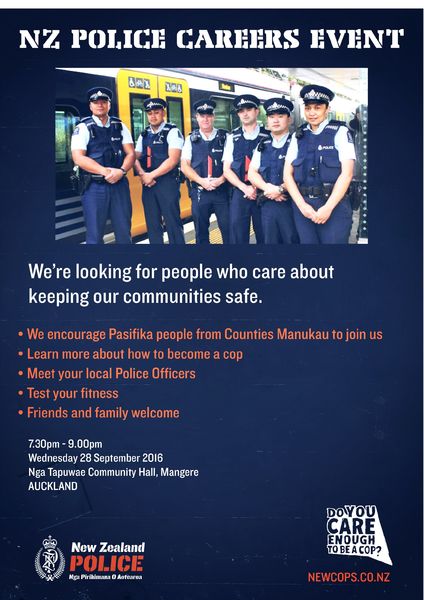Humans of the Islands: Sesilani Ofa
Sesilani Ofa
Proud Mum and One of Only a Few Tongan Police Officers
Tonga
Q & A with Constable Sesilani Ofa
Coco blogger Aaron Taouma met up with Constable Sesilani Ofa who was the first full Tongan female police officer to serve in Auckland and one of the few Tongans in the NZ Police. She has been based at the Otahuhu Police Station for the past eight years and doing it all as a solo-mum.
We think she's a star! Check out her Question and Answer session below and find out about her inspiring story as one of our ‘Humans of the Islands’...
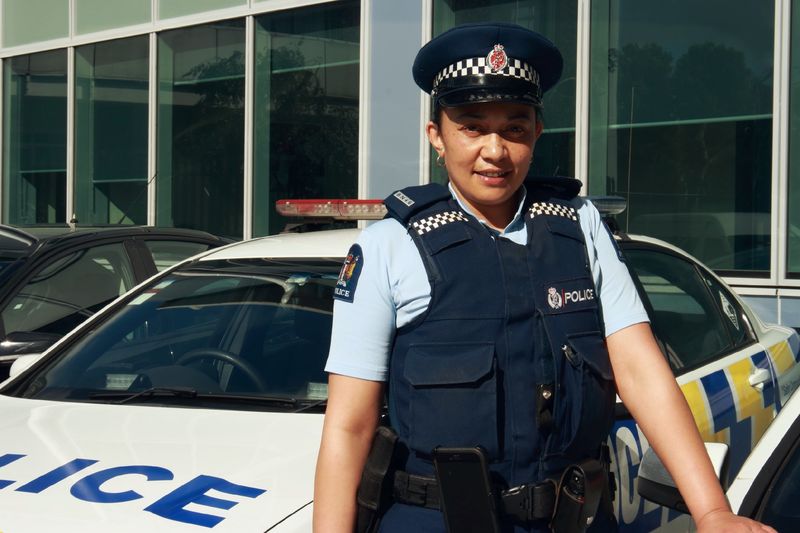
Q. Malo e lelei Sesilani, can you tell us a little about your life growing up and how this may have influenced you joining the Police Force?
A. I was quite fortunate to grow up in a lovely Christian family in Grey Lynn. My father was a reverend at the United Church of Tonga. My dad came from Tonga when he was about 11 or 12 where he attended Epsom Normal Intermediate then on to Auckland Boys Grammar. He returned back to Tonga, met his lovely wife (my mother) before they came back to New Zealand.
I’ve got four brothers and one sister and I think the values that I was taught as a child such as respect, empathy and diversity are part of the values of the New Zealand Police. So me joining the Police goes back to what my parents taught me; to have respect for others, to always help those in need; and that’s the reason why I’m here.
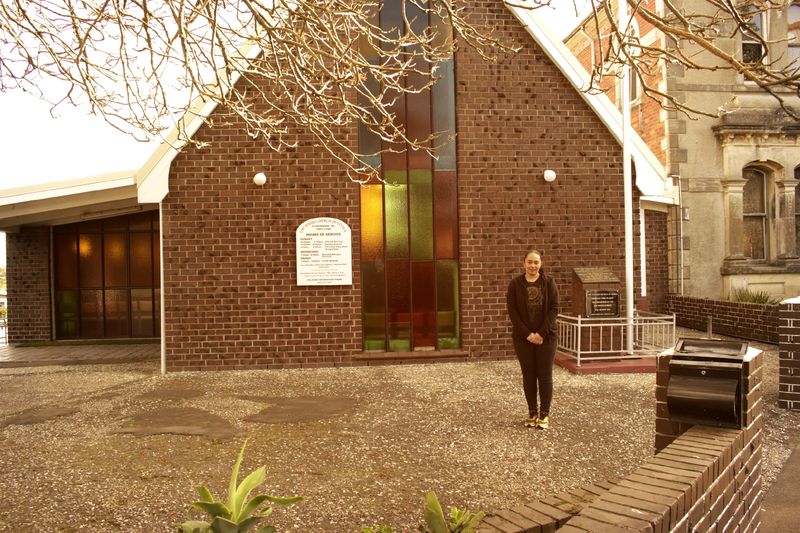
Sesilani outside the United Church of Tonga (Loto Tonga), where her father was the Reverend growing up
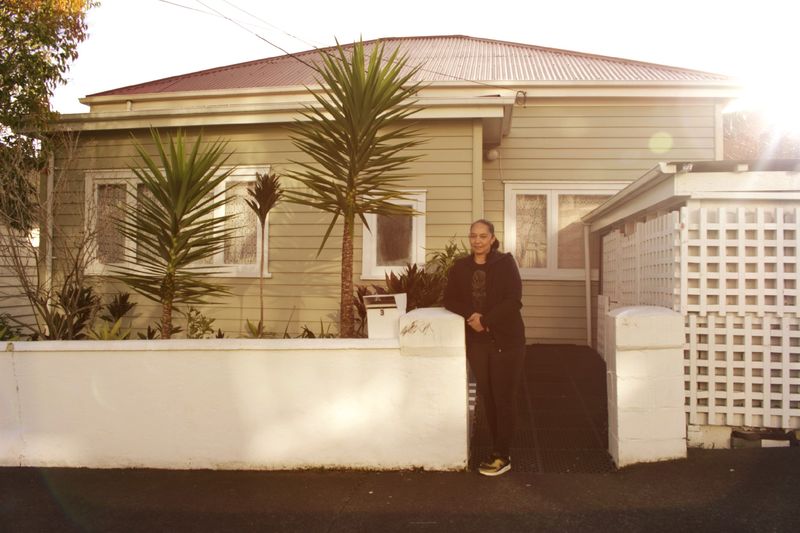
Sesilani outside her childhood home right next to the church
Q. Did you always want to be a police officer?
A. No. I wanted to be a boat builder [laughs]. I remember going to Unitec one day at Intermediate where I saw the boat building course. So, that’s what I always wanted to do. Entering the Police was something that came later. But I was fortunate to grow up in a family that I never saw violence even with my extended family or friends that I grew up with, I never saw any type of violence or criminal activity. As a child I remember always seeing the news and seeing all the disasters happening out in the world and I always wanted to help those in need. That’s what my parents taught me.
The only thing that pulled me back from joining though was the fitness; having to get into swimming and running. And, I couldn’t swim. Well, I could swim but not for the expected time that you need to for the police. So, I went for a couple of swimming lessons and after that I sat my test and passed it. So, that was one thing that was a challenge.
Being a single mum at that time was also hard. I had a daughter and when I went to Police College she was about 5 or 6. So, I was very lucky that I had my parents, my sister and the rest of the family who supported me - especially my mother who pushed me a lot because there were times I was saying nah, I just wanted to give up. But she said, “Just keep trying hard and you’ll get there one day.” And – now, here I am! [laughs]
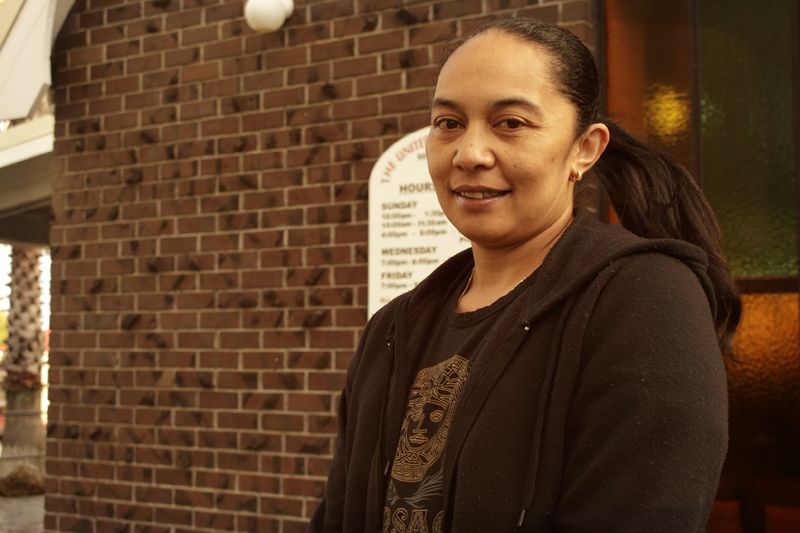
Q. How important is it to have that family support?
A. Oh, it’s very important, as I mentioned before if it wasn’t for my family I wouldn’t be here today. It’s also like here in the police. We’re all like one big family and at the end of the day when we take off that uniform, we’re all humans at the end of the day. So, we do all support each other here and that’s just like out of work also.
Q. What does your daughter think of you being a cop?
A. Yeah, she loves it but I know sometimes maybe she gets annoyed with all the safety issues with being a police officer. I always make sure that she’s safe; letting her go with her friends and that but always reminding her to be aware of what’s around her and don’t speak to strangers and those sorts of things. Other than that I think she is proud of me.
Sesilani’s daughter Flora jumps in:
“Yes, I’m proud of her and it’s fun. My friends all think I have a cool mum.”
Sesilani continues:
It’s okay now that she’s older [14] but when she was younger like in Primary School it was quite hard because I had to do night shifts which would finish at 7am in the morning. I’d come home and take her to school then get a few hours rest, pick her up again from school then only have another two or three hours with her before I had to go back to work again for the next night shift.
I was very thankful for having my mum there and my sister when she returned from Tonga. They both helped and I was secure because I knew that she was with someone safe.
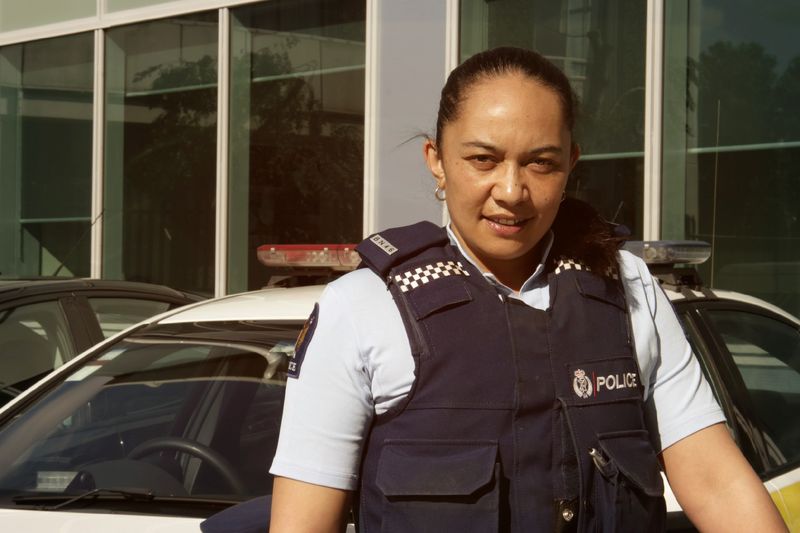
Q. Out of work, are you always a police officer or can you leave work at the door?
A. Well, we can leave all the stresses of work at the door but when I’m out and about if I do see something it is part of our duty to keep the community safe.
Q. What was the reason you entered the force?
A. I think it was for my daughter (bringing her up on my own) and also I wanted to do something more with my life. I was working at Work and Income prior to joining the police, there for about six or seven years. I enjoyed it there but one day I just sat down and said I want to do something better with my life.
Q. What do you think is a hindrance for Pacific Islanders joining the Police Force?
A. It could be different for different people. But I do know I’ve tried to get some of my friends and family to join the police and the major issue has been with the fitness. But, I wasn’t really a sporty person back in school or anything, I just worked very hard to get here. I’m proud of myself for what I’ve achieved.
Q. So you don’t have to be a sporty person to be in the police?
A. It’s more about discipline and for me it was life experience. I joined the police when I was in my thirties. Sometimes I think back and I wish I had joined at a younger age but then I think it was wise for me to join at that age because of the benefit of life experience. That counts a lot because you’re dealing with all sorts of people and you need to know how to respect people, how to talk to them. It’s all about the communication and having real life experience behind you is so important.
Q. So, when you left Police College did you come straight to the Otahuhu Station?
A. Yes. I came out of College and went straight out onto the front line here in Otahuhu. I worked on the front line for five years then decided I needed a little break and at the moment I’m working with the Otahuhu Neighbourhood Policing Team. So, still responding to calls for service but more working with the community and it’s a bit more of a prevention role.
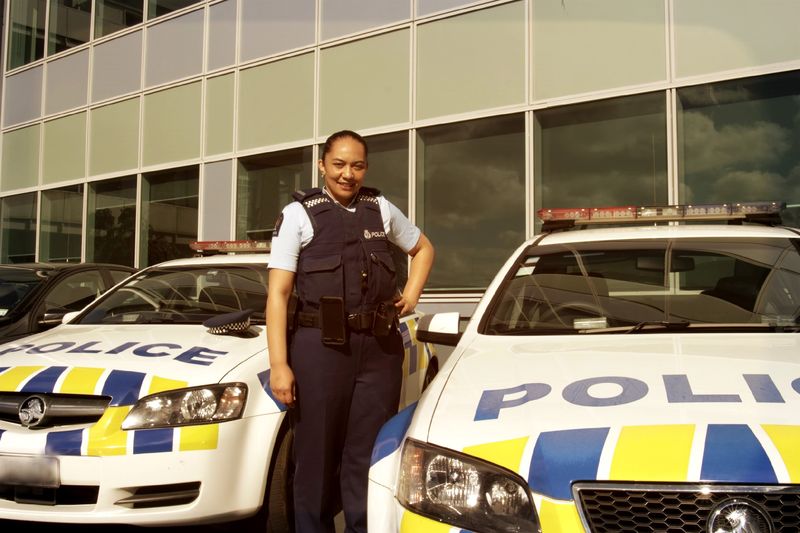
Q. Has that been satisfying?
A. Yes, I love it. We work a lot with the youth and currently have a couple of projects with some of the local churches in Otahuhu where we help in getting a lot of the youth from those churches together. We thought it was incredible there was an example of a Samoan and Tongan church right next to each other and the Reverends had never talked to each other. That’s why we decided to get it up and running and the first time they met each other was when we called a meeting here. We’ve got a few events coming up for the youth, all sorts of things.
We also work a lot with ‘At-Risk-Youth’, we’ve got a lot of youth who are not in ‘mainstream’ school, and we’re talking about 11 and 12 year olds. So, we work with them and their families trying to get them support. We visit them and try to get them and their parents into programmes.
Q. Does it help being Tongan?
A. Yeah it does! Not only for the victims and the offenders I’m dealing with but also for the Police being able to speak fluent Tongan. If I go to a violent situation involving Tongans I’m able to de-escalate it or I’ve had situations where non-English speaking people have gone for a walk-about from the local rest home and I’ve been able to communicate with those people. There’s all sorts of situations where it has come in handy.
There was also a situation where we were looking for someone and because I look Maori the people in the house spoke Tongan to each other and I over heard that this guy was hiding in the closet down the hall. That sort of thing helps as well where we can save time and trouble.
Q. It sounds like such a varied job. Is it?
A. You come every day and you don’t know what you’re going to end up doing. It’s not like a normal job where you know you’re going to do in the morning, this and that. Here, you put on your uniform, line up and then be ready to face what ever comes your way.
Q. Do you have any advice for people who may be considering joining the Police?
A. For me, I just love working for the New Zealand Police. It’s rewarding just being able to help those in need. Not only are we helping our victims from not being re-victimised we’re also helping our offenders so they don’t re-offend. So, for me it’s a very rewarding job.
Q. How beneficial is it to have a diverse police force, to have a mix of cultures and ethnicities?
A. It’s very beneficial. We’re lucky here in South Auckland, we have Samoan fluent speakers, Tonga, Mandarin. We’ve got all sorts. It is so important. I sometimes also get called out to Central areas if they don’t have Tongan police officers available. So, it’s not only for our district here but we can also go out to other areas.
To me, South Auckland and Otahuhu is the heart of Auckland and growing up and living in Grey Lynn and still living in Central and coming out here, now I want to buy a house out here and maybe retire out here. That’s how much I love South Auckland in being such a diverse area. We’re also getting a lot of Pakeha people moving into the area and Otahuhu is looking like being the new Ponsonby maybe in ten years time, especially with the new railway and transport network coming in – we’ve got everything.
This is where I believe I should be because of that diversity.
Q. Do we need more Islanders in the force?
A. We definitely need more [laughs]. We also run recruitment drives and trying to push the fact that we have courses running through Unitec, Te Wananga o Aotearoa and these are all to help our Pacific people. We can actually train them and help them with their journey.
You can meet Constable Ofa and her team at a community event and find out how to make a career of being a police officer on:
Wednesday 28th September
at the Nga Tapuwae Community Hall in Mangere 730pm – 900pm.
Check out Newcops.co.nz for more.
